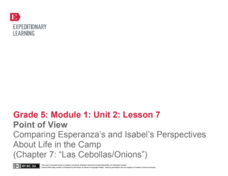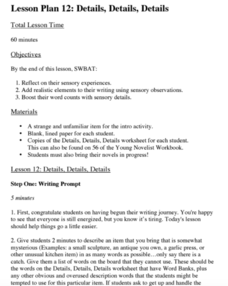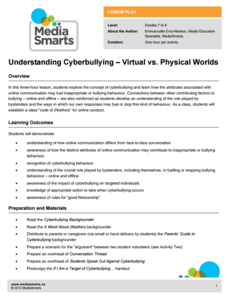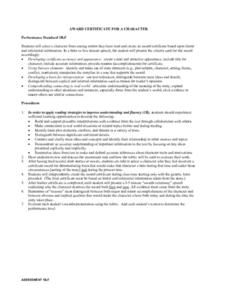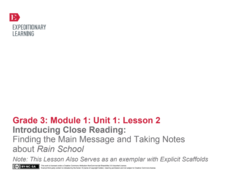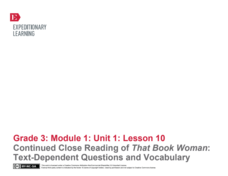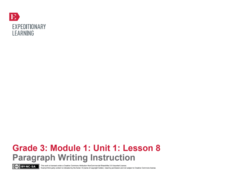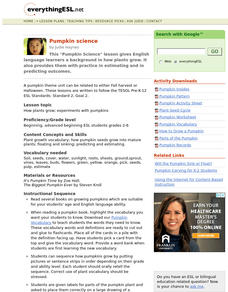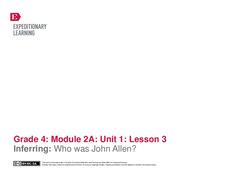Curated OER
Keep Your English Up to Date: Chav
Take a look at linguistics and stereotypes in Great Britian with a word study of "chav." Learners find out what terms are pejoratives and what they are meant to convey. Geared toward British culture, study the ever-changing English...
Curated OER
Keeping Your English Up to Date: Hoodie
Language is fluid, especially the English language. See how it is currently changing and will continue to change. Using the example of the term "hoodie," learners work through a week's worth of vocabulary, spelling, and critical thinking...
Curated OER
Fall Similes
Fall is like a beautiful painting come to life—or is it more like an overflowing cornucopia? Practice writing similes with a instructional activity on figurative language. As learners review simile structure, they come up with their...
EngageNY
Point of View: Comparing Esperanza's and Isabel's Perspectives About Life in the Camp (Chapter 7: "Las Cebollas/Onions")
Explore point of view and more with a Common Core-designed instructional activity. Learners experience different points of view by representing one of two characters from Esperanza Rising during a partner discussion. They must use...
Curated OER
Test Your Speaking & Listening Skills: Class Survey Template
This blank template is the perfect tool for your English language learners conducting short surveys. They record the name of each individual surveyed, and they come up with their own survey topics (which are recorded in the first row)....
Curated OER
Mythological Word Origins
Review myths and the characters therein, connecting them to vocabulary words in the English language today. Begin by searching online for myths and character names. With at least ten names that are familiar English words, students use...
Curated OER
Borrowing Narrative Skills from Mr. Fletcher: Using a "Prompts in Reverse" Technique to Inspire Your Writers
Help your class find their writing voices with this lesson which uses the work of Ralph Fletcher to guide a "Prompt in Reverse" activity. Using the chapter "First Pen" from Fletcher's Marshfield Dreams, learners decipher what they...
Curated OER
Details, Details, Details
Writing can become one-dimensional if authors don't involve all their senses. First, scholars observe a strange object which, ideally, they can touch and even smell. Without using certain words (you can create a list or have the class...
Curated OER
Find Figurative Language
Meet with the school library specialist and work together to plan a visit and presentation on figurative language. After defining and examining examples of targeted terms, the class travels to the library where the SL has collected...
Curated OER
House and Holmes: A Guide to Deductive and Inductive Reasoning
Test your pupils' reasoning skills with several activities and a quick mystery to solve. Learners watch and analyze a few video clips that demonstrate reasoning in action, practice deduction with an interactive and collaborative...
Media Smarts
Understanding Cyberbullying — Virtual vs. Physical Worlds
Spend a few days discussing cyberbullying with an engaging lesson plan. Opening discussion questions get the conversation started while quotes and articles continue thoughtful dialogue. Small group activities and role-play scenarios...
Scholastic
What's Your Angle?
Identifying types of angles meets real-world application in an excellent, hands-on geometry activity. Learners use pipe cleaners and a visual model to independently discover the acute, right, or obtuse angles in their classroom,...
Curated OER
Assessing Research Materials
Teaching learners how to evaluate a research source is an important part of the research process. The fresh idea here is that groups first develop a list of reasons why resources should be evaluated, transform these reasons into...
Curated OER
AWARD CERTIFICATE FOR A CHARACTER
Connect to real-world experiences by having your primary learners create an award certificate based upon literal and inferential information from a story. They present the award to a character from a story and explain the criteria used....
EngageNY
Close Reading of That Book Woman: How Did People Access Books in Rural Areas of the United States?
For this ninth lesson plan in a larger beginning-of-the-year unit, close reading skills are used independently to find the gist of the story That Book Woman. Rereading for important details is the targeted skill to unlock a deeper...
Curated OER
Where Were Your Ancestors in 1871?
Here is a nicely designed lesson on ancestry and family history. In it, learners read an article entitled, "Where Were Your Ancestors in 1871?" Then, they make up a series of questions to profile their family and their community 100...
EngageNY
Introducing Close Reading: Finding the Main Message and Taking Notes About Rain School
This second lesson in a larger unit is perfect for the beginning of the year because it explicitly teaches 3rd graders how to use close reading skills by identifying unfamiliar words, figuring out the gist, and defining important...
EngageNY
Continued Close Reading of Rain School: Text-Dependent Questions and Vocabulary
The engaging story Rain School is further explored in the third lesson of a larger unit that explicitly teaches close reading skills by answering questions whose answers can only be found inside the text. Through teacher...
EngageNY
Continued Close Reading of That Book Woman: Text-Dependent Questions and Vocabulary
Explicitly explained and delightfully detailed are two ways to describe this tenth lesson plan in a larger unit designed for the first few weeks of third grade. Learners continue to use and develop previously learned close reading...
EngageNY
Paragraph Writing Instruction
Writing a paragraph from details found directly in a text is the central focus of this thorough and explicit lesson plan. Using the stories Nasreen's Secret School and Rain School, third graders are lead step-by-step...
Curated OER
Discussing How Plants Grow
Study how plants grow with your English language learners with a cross-curricular lesson revolving around pumpkins. These activities provide opportunities to practice new scientific vocabulary while practicing skills such as estimating...
EngageNY
Introducing Research Folders and Generating a Research Question
Take the next step in the writing process with a lesson plan geared towards the completion of writing an evidence-based essay about a rule to live by, as Bud did in Bud, Not Buddy by Christopher Paul Curtis. Pupils collaborate with their...
EngageNY
Inferring: Who was John Allen?
Help your learners work with difficult or archaic words. A continuation of lesson two of this module, the plan here focuses on deciphering the Inventory of John Allen, in particular the unfamiliar words that make up much of the list. Add...
EngageNY
Mid-Unit 1 Assessment: Inferring with Pictures and Text
Mark the mid-point in the module with the authentic assessment described and provided here—the assessment and the unit focus on inferring using pictures and text. Pupils are given an image, a graphic organizer, and an article and must...



